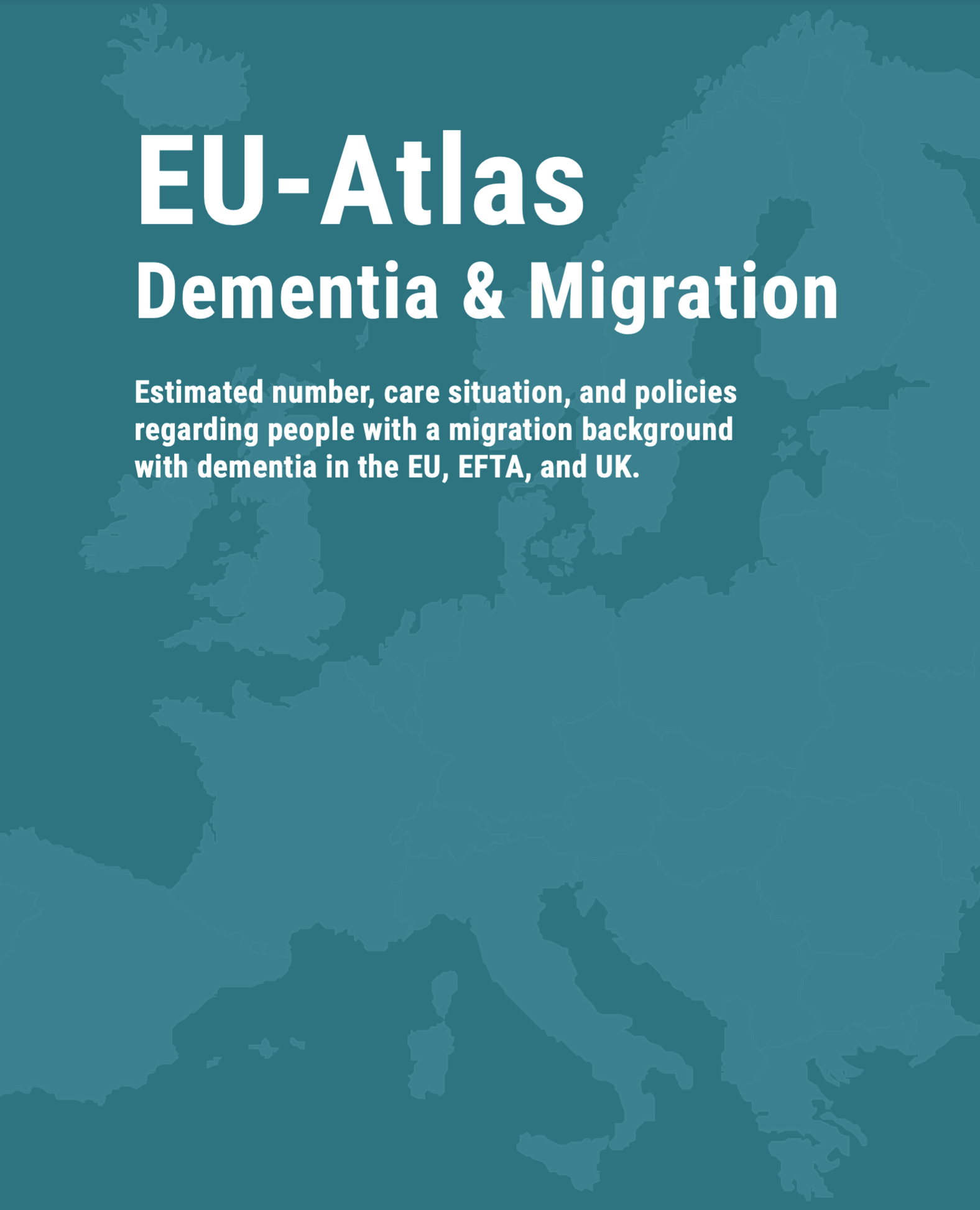| Largest group | 2. largest group | 3. largest group | 4. largest group | 5. largest group | |
| Absolute numbers | |||||
| PwMD per 100,000 inhabitants 65+ |
| Absolute numbers | PwMD per 100,000 inhabitants 65+ | |
| Largest group | ||
| 2. largest group | ||
| 3. largest group | ||
| 4. largest group | ||
| 5. largest group |
| Prevalence per 100,000 inhabitants 65+*, calculated by country of residence | |||
|---|---|---|---|
| high > PwMD |
minor > - PwMD |
||
| increased > - PwMD |
low ≤ PwMD | ||
| medium > - PwMD |
|||
| PwMD = People with a Migration background with Dementia *Bulgarien, Litauen, Malta, Polen in der Bevölkerung 60+ |
|||
| Absolute number of PwMD 65+ | |
| PwMD per 100,000 inhabitants 65+ |
General introduction
For people with a migration background who are affected by dementia, access to medical information, medical care and care services can prove difficult due to language barriers and cultural differences to the native population: This is because culturally sensitive medical and nursing care as well as multilingual information materials have not yet become standard - neither in Germany nor in many other parts of Europe. However, the way the topic of "dementia and migration" is dealt with varies greatly from country to country. Researchers at the DZNE have examined the situation in 35 European countries as part of a research project funded by the Robert Bosch Stiftung. The result is the "EU Atlas: Dementia & Migration", which breaks down the situation with extensive data and maps - and presents country-specific experiences, challenges and also examples of good practice.
Currently, 86.7 million people with a migration background (PwM) live in Europe. Out of which 16.2% are 65 years or older (approximately 14 million)1 and are thus in an age group with an increased risk of developing dementia. Furthermore, scientific studies suggest that PwM have a higher risk of dementia than people without a migration background2,3. An analysis from 2019 estimates the number of PwM with dementia in the European Union (EU) and European Free Trade Association (EFTA) member states to be about 475,0004. Our survey for the EU Atlas yielded slightly higher numbers, leading to an estimate of approximate 531,400 PwM with dementia.
The health consequences of dementia are often worse for PwM than for people from the autochthounus population. One of the reasons is that the healthcare system is often not equipped to take care of this population and does not have healthcare services appropriate for their needs. Simultaneously, there is often a lack of knowledge about dementia, the healthcare system, and its care services on the side of PwM5. These and other problems, as well as the expected increase in the number of PwM with dementia in the coming years pose a challenge of an unknown magnitude for healthcare systems in Europe. To face this challenge and to provide people affected with the best support and information possible, healthcare systems, healthcare professionals, politicians, and stakeholders need more information on this vulnerable population. Evidence is needed on the number of PwM with dementia, how they are included in the healthcare systems at the moment, and where room for improvement exists. Such insights can not only guide people and organisations working with people on a daily basis, but also and equally important can be of significance in strategically developing healthcare systems and its services on a political level in laws, policies, strategies, and action plans. The "EU Atlas: Dementia and Migration" is especially intended to be used for the latter.
Data on the number of PwM with dementia in Europe exist, however they are scarce, and data for all EU and EFTA countries and the UK broken down by individual countries of birth are missing. Within different countries, there are more and more strategies, plans, and guidelines raising awareness on dementia and discussing improvement of treatment and care for people with dementia and their families. However, to the best of the author’s knowledge no data has been produced that gives an overview of the prevalence of dementia and national documents on dementia across Europe with a focus on PwM.
Having identified this gap of information, the aim was to create an atlas that provides:
- prevalence data and graphical presentation for the 27 EU and 4 EFTA member states as well as the UK;
- analyses of national dementia plans (NDPs) and guidelines on diagnosis, treatment, and care; and,
- analyses of healthcare systems in terms of the services and support they provide for the people affected. This atlas focuses on dementia in PwM. It is a supplement to the vast literature and knowledge about dementia, and a valuable resource due to its sharp focus on the healthcare situation of PwM with dementia.
References
- International Organization for Migration: Total number of international migrants at mid-year 2020: Europe; 2021.
- Adelman S, Blanchard M, Rait G, Leavey G, Livingston G: Prevalence of dementia in African-Caribbean compared with UK-born White older people: two-stage cross-sectional study. Br J Psychiatry 2011, 199(2):119-125.
- Parlevliet JL, Uysal-Bozkir Ö, Goudsmit M, van Campen JP, Kok RM, Ter Riet G, Schmand B, de Rooij SE: Prevalence of mild cognitive impairment and dementia in older non-western immigrants in the Netherlands: a cross-sectional study. Int J Geriatr Psychiatry 2016, 31(9):1040-1049.
- Canevelli M, Lacorte E, Cova I, Zaccaria V, Valletta M, Raganato R, Bruno G, Bargagli AM, Pomati S, Pantoni L et al: Estimating dementia cases amongst migrants living in Europe. European Journal of Neurology 2019, 26(9):1191-1199.
- Alzheimer Europe: the development of intercultural care and support for people with dementia from minority ethnic groups. In. Luxemburg: Alzheimer Europe; 2018.



![[Translate to Englisch:] Logo Community Medicine [Translate to Englisch:] Logo Community Medicine](/fileadmin/_processed_/3/7/csm_Signet_203bb5aa82.png)
![[Translate to Englisch:] Logo Universitätsmedizin Greifswald [Translate to Englisch:] Logo Universitätsmedizin Greifswald](/fileadmin/_processed_/0/d/csm_Logo_o_siegel_cmyk_e5b5a1454d.png)
